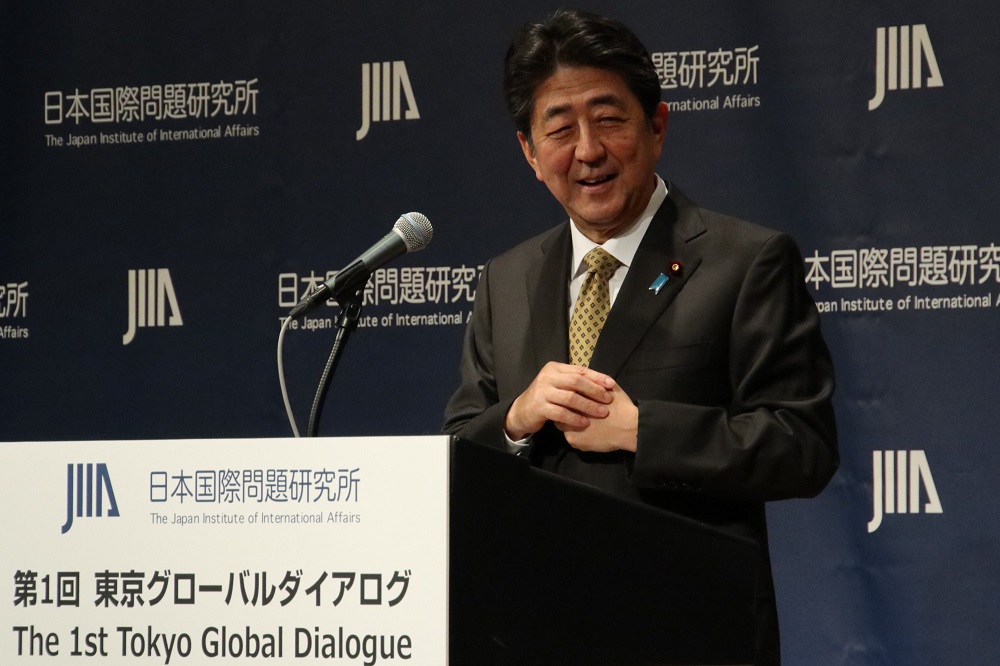
The inaugural Tokyo Global Dialogue took place on 2 and 3 December to mark the founding of the Japan Institute for International Affairs (JIIA), by Shigeru Yoshida, who served as the country’s prime minister from 1946–47 and again from 1948–54.
The track 1.5 event gathered together an array of regional and international experts from government, think tanks and academia to debate the proposition: ‘Is it possible to build an international order based on free, fair and transparent rules?’ Speakers included Japanese Prime Minister Shinzo Abe and Foreign Minister Toshimitsu Motegi as well as leading defence and foreign policy specialists from around the globe.
The 700 participants hotly debated the nature of international order. On the headline issue of a ‘free, fair and transparent’ international order there were naturally divergent views from the parties involved. There was strong consensus that the ‘liberal international order’ championed by the West and spread more widely across the globe in the post–Cold War ‘unipolar moment’ was under siege from within and without.
Western-held values such as democracy, human rights, multilateralism and free trade that in many ways underpinned the globalisation process are now challenged by ‘revisionist’ authoritarian states led by China and Russia, with others such as Iran and North Korea also prolific irritants to this order. Evidence of this is to be found in heightened Sino-US strategic and economic rivalry, the collapse of arms-control regimes (such as the INF Treaty) and simmering turmoil in global hot spots such as the Middle East.
The liberal international order is also being hollowed out from within, with its key Western champions losing faith in their core values in the face of rising economic inequalities, and undermined domestically by populist and anti-globalisation movements, lending support for international isolationism and protectionism. The political disarray of the US and the Brexit process in the UK are stark evidence of this.
These trends are being exacerbated by the prevalence of disruptive digital technologies including social media, leading to ‘fake news’, cyber warfare and interference operations; as well as the employment of advanced surveillance technologies to control public opinion in authoritarian states. The actions of the Chinese Communist Party in Xinjiang and Hong Kong came in for strong criticism from some participants, which a Chinese respondent countered were clearly the work of an American ‘black hand’.
For an international symposium held in Northeast Asia, the concept of the ‘Indo-Pacific’ was point of particular contention, as the US and its allies seek to advance their ‘free and open Indo-Pacific’ (FOIP) initiative to address territorial and international legal disputes, safeguard the maritime commons, and deal with issues of infrastructure development and connectivity. The US and its allies advocated that the principles of ‘free, fair and transparent’ behaviour were the best way to counter the Chinese Belt and Road Initiative (BRI), which seeks to expand strategic control across parts of Southeast Asia, the Indian Ocean and South Pacific.
There was also debate in Tokyo around the genuine inclusivity of the FOIP since authoritarian powers would not only have to radically adjust their existing policies to conform with the liberal principles that are embedded in it, but also because they are presently concentrating on alternative governance structures to facilitate their own preferred institutions, such as the Shanghai Cooperation Organisation, Asian Infrastructure Investment Bank and BRI. Thus we can discern two competing orders—the Western liberal democratic one and the authoritarian alternative led by rising powers. The future international order will be shaped by the tension between these two antithetical visions.
While the US and its allies were adamant that their liberal international order had served the world well in terms of bringing peace and prosperity, they recognised that more needed to be done to restore trust in a system that was certainly ‘good’ but not ‘perfect’. In this respect, both domestic and international (multilateral) governance needed rethinking and reforming to adapt to a new era, as outlined at the dialogue by Motegi.
Even the Western participants were divided on whether it was possible to maintain the liberal order globally, or whether it would simply revert to a ‘bounded order’ that encompassed only the democratic powers. Outside of this community those powers would be confronted by an external operating environment in which their values and norms held lesser sway. One outspoken Chinese participant left little doubt that this non-democratic condominium would be presided over by a triumphant China.
Overall, the Tokyo Global Dialogue sought to fulfil two objectives according to JIIA President and former ambassador Kenichiro Sasae: to open free and frank discussion on the problems of an unstable international order, and to step up efforts by JIIA to research and disseminate timely analysis on such matters. This initial gathering made an admirable contribution to both these missions.

